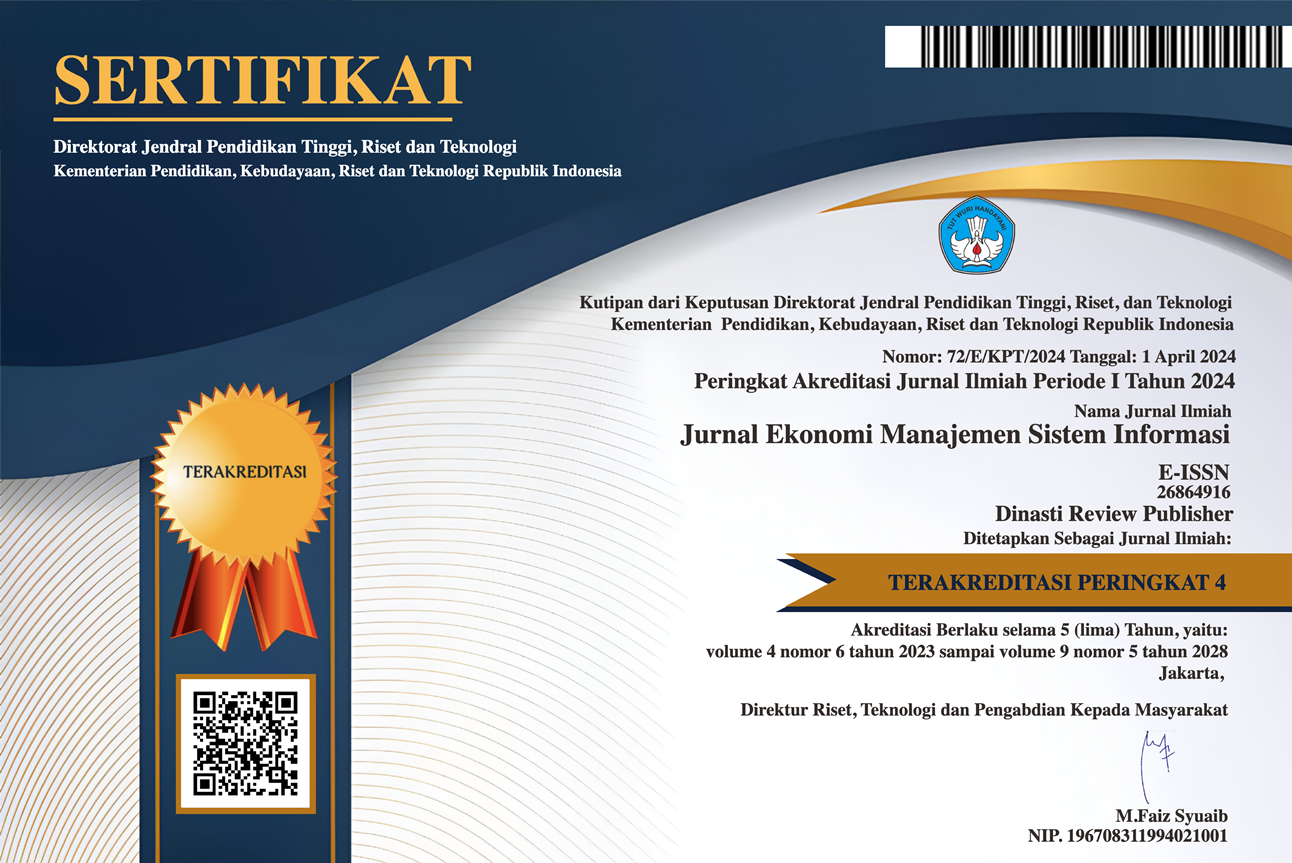Analysis of Local Coffee Shop Marketing Agility and Customer Retention Amidst of Starbucks Boycott in Padang
DOI:
https://doi.org/10.38035/jemsi.v6i4.4489Keywords:
Qualitative, Segmentation, Marketing Agility, Customer Retention, Boycott, Fear of Failure, Local Coffee ShopAbstract
This study aims to examine the segmentation, marketing agility, and customer retention of local coffee shop in Padang. The phenomena that discussed in this research are boycott movement of several brand particularly Starbucks and Fear of Failure. This research adopts a qualitative approach which aims to understand symptoms that do not require quantitative measurement. The data used in this research is derived from interview with the owner of local coffee shop in Padang with the total of 5 informant. The data analysis process is compiling data obtained from interviews and process it with Nvivo12. Boycott was found to have no influences towards Marketing Agility and Customer Retention of Local Coffee Shop in Padang. Nonetheless Fear of Failure was found to have influences towards Marketing Agility and Customer Retention of Local Coffee Shop in Padang.
References
Alkitbi, S. S., Alshurideh, M., Al Kurdi, B., & Salloum, S. A. (2021). Factors Affect Customer Retention: A Systematic Review. Advances in Intelligent Systems and Computing, 1261 AISC, 656–667. https://doi.org/10.1007/978-3-030-58669-0_59
Arslan, A., Kamara, S., Tian, A. Y., Rodgers, P., & Kontkanen, M. (2024). Marketing agility in underdog entrepreneurship: A qualitative assessment in post-conflict Sub-Saharan African context. Journal of Business Research, 173. https://doi.org/10.1016/j.jbusres.2023.114488
Chapman Cook, M., & Karau, S. J. (2023). Opportunity in uncertainty: small business response to COVID-19. Innovation and Management Review, 20(2), 162–178. https://doi.org/10.1108/INMR-11-2021-0226
Games, D., Agriqisthi, & Sari, D. K. (2020). Earthquakes, fear of failure, and wellbeing: An insight from Minangkabau entrepreneurship. International Journal of Disaster Risk Reduction, 51. https://doi.org/10.1016/j.ijdrr.2020.101815
Gupta, S., Malhotra, N. K., Czinkota, M., & Foroudi, P. (2016). Marketing innovation: A consequence of competitiveness. Journal of Business Research, 69(12), 5671–5681. https://doi.org/10.1016/j.jbusres.2016.02.042
Grossman, O., & Rachamim, M. (2024). How can coffee shops draw customers back after COVID-19? the influence of psychological distance on coffee versus tea preference. Journal of Business Research, 172. https://doi.org/10.1016/j.jbusres.2023.114431
Hochstein, B., Voorhees, C. M., Pratt, A. B., Rangarajan, D., Nagel, D. M., & Mehrotra, V. (2023). Customer success management, customer health, and retention in B2B industries. International Journal of Research in Marketing, 40(4), 912–932. https://doi.org/10.1016/j.ijresmar.2023.09.002
Hu, Q., Hughes, M. (Mat), & Hughes, P. (2022). Family-unique resources, marketing resources, and family owners’ willingness to pursue radical innovation: A model and test. Journal of Business Research, 146, 264–276. https://doi.org/10.1016/j.jbusres.2022.03.082
Islam, T., Ahmed, I., Ali, G., & Ahmer, Z. (2019). Emerging trend of coffee cafe in Pakistan: factors affecting revisit intention. British Food Journal, 121(9), 2132–2147. https://doi.org/10.1108/BFJ-12-2018-0805
Kalaignanam, K., Tuli, K. R., Kushwaha, T., Lee, L., & Gal, D. (2021). Marketing Agility: The Concept, Antecedents, and a Research Agenda. Journal of Marketing, 85(1), 35–58. https://doi.org/10.1177/0022242920952760
Mamonto, A., Lapian, J., & Tielung…, M. V. J. (2020). THE ANALYSIS OF CUSTOMER RETENTION AND CUSTOMER’S EMOTIONAL EXPERIENCE IN LOCAL COFFEE SHOP (CASE STUDY OF NOMAD COFFEE SHOP). Jurnal EMBA, 8(1), 371–380.
Olazo, D. B. (2023). Marketing competency, marketing innovation and sustainable competitive advantage of small and medium enterprises (SMEs): a mixed-method analysis. Asia Pacific Journal of Marketing and Logistics, 35(4), 890–907. https://doi.org/10.1108/APJML-01-2022-0050
Salma, S. Y., & Aji, H. M. (2023). What drives Muslims to boycott French brands? The moderating role of brand judgement and counterargument. Journal of Islamic Marketing, 14(5), 1346–1368. https://doi.org/10.1108/JIMA-04-2021-01288
Salamah, A. A., Hassan, S., Aljaafreh, A., Zabadi, W. A., AlQudah, M. A., Hayat, N., Al Mamun, A., & Kanesan, T. (2022). Customer retention through service quality and satisfaction: using hybrid SEM-neural network analysis approach. Heliyon, 8(9). https://doi.org/10.1016/j.heliyon.2022.e10570
Simanjuntak, M., Putri, N. E., Yuliati, L. N., & Sabri, M. F. (2020). Enhancing customer retention using customer relationship management approach in car loan bussiness. Cogent Business and Management, 7(1). https://doi.org/10.1080/23311975.2020.1738200
Wu, C. W., Botella-Carrubi, D., & Blanco-González-Tejero, C. (2024). The empirical study of digital marketing strategy and performance in small and medium-sized enterprises (SMEs). Technological Forecasting and Social Change, 200. https://doi.org/10.1016/j.techfore.2023.123142
Wardhana, F., Le, V., Masli, E., & Sok, M. (2023). What Makes a Coffee Shop Interesting? Demystifying Critical Factors that Attract and Retain Coffee Shop Customers in Indonesia (pp. 259–272). https://doi.org/10.2991/978-94-6463-350-4_25
Zulkepli, Z. H., Hasnan, N., & Mohtar, S. (2015). Communication and Service Innovation in Small and Medium Enterprises (SMEs). Procedia - Social and Behavioral Sciences, 211, 437–441. https://doi.org/10.1016/j.sbspro.2015.11.057
Downloads
Published
How to Cite
Issue
Section
License
Copyright (c) 2025 Danis Ganeru, Vera Pujani, Yulia Hendri Yeni

This work is licensed under a Creative Commons Attribution 4.0 International License.
Hak cipta :
Penulis yang mempublikasikan manuskripnya di jurnal ini menyetujui ketentuan berikut:
- Hak cipta pada setiap artikel adalah milik penulis.
- Penulis mengakui bahwa Jurnal Ekonomi Manajemen Sistem Informasi (JEMSI) berhak menjadi yang pertama menerbitkan dengan lisensi Creative Commons Attribution 4.0 International (Attribution 4.0 International CC BY 4.0) .
- Penulis dapat mengirimkan artikel secara terpisah, mengatur distribusi non-eksklusif manuskrip yang telah diterbitkan dalam jurnal ini ke versi lain (misalnya, dikirim ke repositori institusi penulis, publikasi ke dalam buku, dll.), dengan mengakui bahwa manuskrip telah diterbitkan pertama kali di Jurnal Ekonomi Manajemen Sistem Informasi (JEMSI).










































































